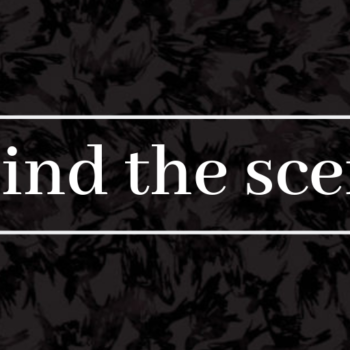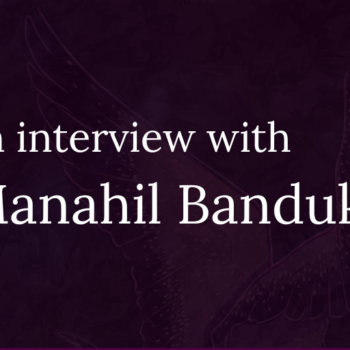
Challenges and Curiosity: Adventures in Editing SFF
- Posted by Augur Blog
- On August 15, 2022
- 0 Comments
- literary magazine, speculative fiction
In case you missed it, Uncanny Magazine is hosting its Year 9 Kickstarter: To Fifty … and Beyond! Friends and editors Chimedum Ohaegbu and Monte Lin dropped by for a guest post. Together, they discuss what’s it’s like to edit one of the leading magazines in the SFF community. And, of course, our favourite question: what’s exciting in speculative fiction right now.
What first drew you to speculative fiction?
MONTE LIN (ML): It’s a tough question because when I was a kid, I just read a random assortment of everything through the library and Scholastic Book Fairs, so I didn’t realize there was a division between speculative fiction and other genres. I still remember vividly being engrossed by The Secret Garden by Frances Hodgson Burnett before being told it was “girl’s literature,” for example. Madeleine L’Engle’s A Wrinkle in Time might have been the “first” sci-fi novel I read, and it obviously left an impact on me because I saw a production of A Wrinkle in Time at the Oregon Shakespeare Festival in Ashland in 2014 and left the theater breathless. And I can’t ignore the effect of first opening the Red Box Dungeons & Dragons set so many decades ago.
What have you learned, or unlearned, while editing here? What strengths have you discovered/developed further?
CHIMEDUM OHAEGBU (CO): I’ve learned so much while editing here—particularly with the poetry, but the copyediting itself has been so informative! I’ve learned to read in different ways, to reread, that a lot of editing in short fiction is curatorial and not just developmental, about defamiliarizing a piece a bit by reading it in different places, with different fonts or orientations…the list goes on. But in sum, I’ve learnt so much about the inherent collaborativeness (collaborativity?) of the editing process, which is truly a two-way street.
How has your perspective on editing and publishing SFF changed since you joined Uncanny?
ML: My perspective hasn’t changed, actually! Coming from tabletop roleplaying game publishing, I’ve been on the writer side rushing to deadline, the editor side trying get everyone to follow the style guide, and the production side gently nudging everyone to stay on schedule. And since ttrpg publishing can take years, maybe I’m more impressed by Uncanny, since we have to meet regular bi-monthly deadlines.
How has your approach to writing your own work changed from when you first started?
CO: I think my approach to publishing my work more than writing it has changed since starting with Uncanny—that is, knowledge of just how many submissions, and just how many excellent stories and poems and articles and art can’t be bought due to space by any given magazine, has been encouraging: rejections aren’t necessarily a reflection of the quality of a work. So I think it’s shored up my resiliency in that arena.
What excites you most about the speculative field right now?
ML: I’m weirdly excited about novellas? It might be because at the beginning of the pandemic, I had trouble reading long-term works. Novellas have that bite-sized sweet spot between digging into a world but leaving me a bit hungry for more food like Sarah Gailey’s River of Teeth, Seanan McGuire’s Wayward Children series, and Nghi Vo’s Empress of Salt and Fortune (next on my many, many to-read piles).
Monte, what are you most excited about with your new role as Managing Editor?
ML: I’m really interested in all the behind-the-scenes mechanical parts of assembling the magazine, which might be weird to say from a writer/editor! Maybe this is because of my game and QA background, but I do like to understand how things and systems work. (Unlike my QA background, however, I’m not aiming to break things now!)
Chimedum, what did you enjoy most about editing poetry with Uncanny?
CO: What I most enjoyed about editing the poetry was…well, hard to choose just one thing, honestly! I loved all parts of the process—diving into the submissions pool to find something new, receiving great work from our solicited poets, reading poems deeply and working with the authors on edits…so much beautiful, interesting, startling work came through during my term, and I’m so appreciative of the poetry community for blessing Uncanny, and me as the poetry editor, with their pieces. Thank you!
What’s something you’re both excited to see for Issue #50, and beyond?
ML: To contradict myself a little from my earlier answer, I’m looking forward to how Year 9 will highlight flash in every issue (now that the Kickstarter has reached that stretch goal, yay!). The writerly side of me likes seeing how other writers can distill story and craft into such condensed bits. Uncanny has a particular tone we tend toward so I really Mam interested in seeing how authors can purify that into less than a thousand words.
CO: I’m super excited to see how the double issue goes! I think that’ll keep me flush in reading material for a while and start 2023 with the good news we could all use, lately. I’m also so thrilled for the rest of the next Uncanny year, because it’ll be all surprises since the solicited authors are all in Issue 50! I’m always pleasantly surprised by what we get to publish, but I think this upcoming year’s structure will make it even more of a delight.
Looking back, what’s something you’ve enjoyed over the course of Uncanny’s soon-to-be-50 issues?
ML: Of course I’ve enjoyed the stories, essays, and poems, but I want to give a shout out to Year 8’s cover artists: Kirbi Fagan, Elaine Ho, Paul Lewin, Galen Dara, and Grace P. Fong. Uncanny publishes a lot of award-winning work, but I’d like to think the colorful and amazing covers also have something to do with the magazine’s success.
While being rained on adjacent to Portland, Oregon, MONTE LIN edits and plays tabletop roleplaying games and writes short stories. Clarion West got him to write about dying universes, dreaming mountains, and singularities made of anxieties. He can be found tweeting Doctor Who news, Asian American diaspora discourse, and his board game losses at @Monte_Lin.
CHIMEDUM OHAEGBU (CHIM-ay-doom aw-HAY-boo, she/her) currently lives in Treaty 7 territory in Calgary, Alberta. She’s an editorial assistant at McClelland & Stewart, as well as Uncanny Magazine’s managing and poetry editor and a Hugo Award winner. Her fiction debut was longlisted for the Nommo Award for African Science Fiction and Fantasy, and she holds a Pushcart Prize nomination for poetry. She’s a 2021 graduate of UBC’s Creative Writing Program (Bachelor of Fine Arts) and, as a playwright, of the Black Arts Development Program, and is a member of The Capilano Review‘s editorial board. She loves insect facts but not insects, birds and magpies especially, and orchestral videogame music. Her fondness of bad puns has miraculously not prevented her work from being published in Strange Horizons, Arc Poetry Magazine, CV2 Magazine, and The Magazine of Fantasy and Science Fiction, among others. Find her at www.chimedum.com.
LIKED THIS POST? Give Uncanny Magazine some love on Kickstarter. Let’s see if we can get them to their next stretch goal for Year 9.




0 Comments